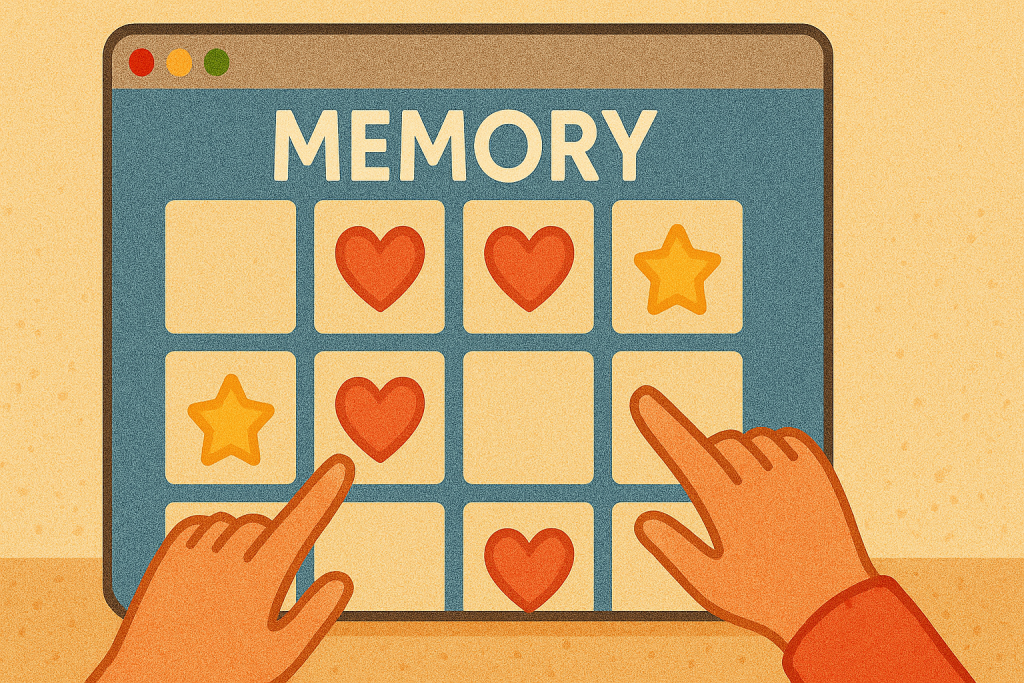Some minds hold a lifetime of memories – others seem to forget everything the moment they live through. Nonetheless, any mind can be trained to capture each valuable bit, though effort, dedication, and some time are required. Our brains, much like muscles, respond to exercise and stimulation, and with the right tools, memory can be strengthened anyway.
One of the most enjoyable ways to do so is through memory games online. Their main target is to expand the capacity of the brain and let it uncover its true potential (to hold more info, to store it properly, to use it anytime). So, what are they, and how to employ them appropriately so as not to fall into the trap of deceitful marketing and misleading propositions?

How Does Memory Work?
Memory is a phenomenon that cannot be explained in simple terms but is quite coherent and easy to understand. The mechanisms lying behind the way our brain takes in information, stores it, and brings it back upon request may be divided into three major groups:
- Encoding: This is where memory begins. Your brain takes in information from the senses (what you see, hear, feel, etc.) and turns it into a form it can process. The more attentive a person is, the more details the brain is able to store.
- Storage: When encoded, the information is kept in the brain’s storage. Short-term memory holds small bits that have been perceived recently, right in the moment. Long-term memory, on its part, stores knowledge, experiences, feelings, and skills for days, years, or even a lifetime.
- Retrieval: Last but not least, here is the act of pulling stored information back into use. At times, retrieval can be instant, but other times it takes effort (like trying to remember someone’s name).
Since the brain itself may boast a sophisticated structure, there are certain parts that should work together for these stages to be processed properly:
- The hippocampus helps form and organize new memories.
- The amygdala adds emotion to the rigid form.
- The cerebral cortex stores long-term knowledge and experiences.
How Online Memory Games Help
For some people, the word “game” may only mean something entertaining but never educational. In reality, though, this is not true. Games that have been designed to stimulate brain activity are a perfect match for people who need a challenge on the spot. Here is how they generally work:
- Boost Attention and Focus: Many memory games require spotting patterns, matching cards, or remembering sequences. These tasks are meant to strengthen your ability to concentrate, which is the foundation for storing and retrieving information effectively.
- Improve Short-Term and Working Memory: Games that ask you to hold onto information briefly train your working memory in the online regime. Over time, this improves your capacity to juggle multiple details at once (though it can be quite difficult at first).
- Encourage Mental Flexibility: Constantly switching between different types of challenges keeps your brain adaptable and active, taking one out of the automatic state. This is actually a life-saving skill to be able to notice certain details, even though the world does not seem to be helpful on this path.
- Reduce Stress While Exercising the Brain: Unlike studying or work-related tasks, memory games can be playful (and never mandatory). This relaxed state makes learning and recall more efficient, with no stress intended.
- Accessible Brain Training for All Ages: No matter how old a “student” is, they are capable of trying these tools, for they are easy to access and adapt to different skill levels at once.
Types of Memory Games Online
In general, memory games can be categorized into groups based on the specific cognitive skills they train and the way they challenge brain function. Some tools, though, may combine different approaches and seem like universal instruments for brain workouts while at home.
| Type of Game | Core Idea | Skills Trained | Examples |
| Matching & Pair Games | Players reveal hidden cards/tiles and try to remember their locations. | Short-term recall, focus, attention | Concentration, Memory Match, Pairs |
| Sequence & Pattern Games | Reproduce or extend sequences of colors, numbers, or sounds. | Working memory, concentration, reaction time | Simon, Lumosity Memory Matrix |
| Puzzle & Logic Games | Solve visual puzzles, number grids, or logical challenges. | Problem-solving, pattern recognition | Sudoku, Jigsaw Planet, Nonograms |
| Trivia & Quiz Games | Retrieve knowledge quickly in timed question-and-answer formats. | Long-term recall, knowledge retention | Trivia Crack, QuizUp, Kahoot! |
| Word & Language Games | Build, find, or connect words within set rules or grids. | Verbal memory, vocabulary, cognitive speed | Wordle, Crosswords, Word Search |
| Story/Adventure Games | Progress by remembering clues, storylines, or map details. | Episodic memory, logical thinking, strategy | Escape Room Games, Professor Layton |
*By the way, all the above-mentioned types are also available in “all-in-one” apps like Mind Elevate or Lumosity, which makes it easier for one not to jump between different resources to train.
Choosing the Right Game for You

So as to make sure the tools align with your current skill levels and general requests, it is vital to know where to start and how to select the game. This is why you should take into consideration the following:
- Consider Your Goal: Try to answer the question of whether you are looking to sharpen short-term recall, boost long-term memory, improve attention, or simply have fun. Matching games and sequence challenges, for instance, are great for quick recall and focus, but word games are ideal for retrieving knowledge from long-term memory.
- Start at Your Skill Level: Many games offer adjustable difficulty levels. Beginners should start with simple levels to understand how the app functions, while experienced players can jump into advanced challenges to keep the brain engaged (remember Duolingo and its feature set).
- Mix and Match: Use a few game types at the same time to exercise different areas of the brain. Switch between puzzles, matching, and trivia to make your training more comprehensive and prevent monotony (games are meant to be pleasant, not boring in the end).
- Accessibility and Convenience: Choose an appropriate platform and format that makes it easy to play regularly, so that training does not feel like a chore anymore.
- Engagement Factor: Mind that the best memory game is one you enjoy. Opt for the games you truly love – not those that are popular and promoted by the media.
Test Your Memory Right Now!
How to Play
Look at the list of words below for 20 seconds.
After 20 seconds, cover the list (or scroll down) and try to write down as many words as you remember.
Check your results with the original list.
Word List (Example)
- Apple
- Bicycle
- Moon
- River
- Train
- Chair
- Sun
- Book
- Dog
- Star
- Table
- Flower
- Car
- Mountain
- Pen
- Phone
- Cat
- Cloud
- Glass
- Watch
Challenge Tip: Try to visualize each word in your mind or make little stories connecting them. Your mind loves associations – we promise!
Scoring
- 0–5 words: Beginner – Your memory is like a fresh sheet of paper.
- 6–12 words: Intermediate – Your brain is keeping up well!
- 13–20 words: Memory Master – Impressive recall!
Memories, even your most precious ones, fade surprisingly quickly – never let them slip away.